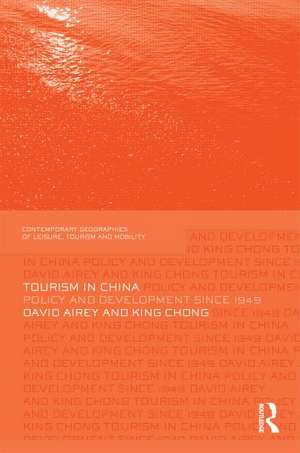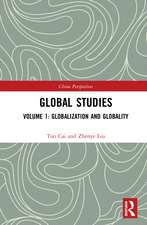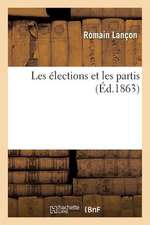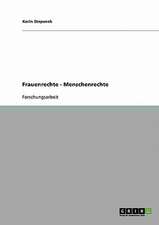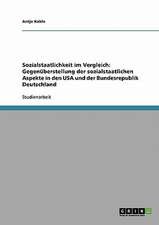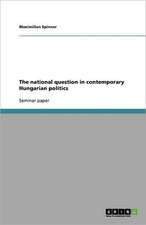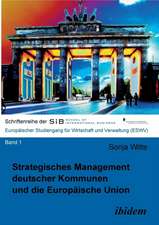Tourism in China: Policy and Development Since 1949: Contemporary Geographies of Leisure, Tourism and Mobility
Autor David Airey, King Chongen Limba Engleză Hardback – 13 apr 2011
This is the first book to set the development of tourism in China since 1949 in its policy context. Underpinned by a strong conceptual framework, this systematic study of China contributes to an in-depth understanding of how public policy-making for tourism works and how it affects the development of tourism in the real world. The text explores tourism policy during three distinct leadership periods since creation of the People’s Republic of China in 1949: Mao Zedong (1949-1978); Deng Xiaoping (1978-1997) and the Collective Leadership Era (1997-the present). The attitudes and values of leaders and central government agencies towards tourism are considered, as well as the interactions of ideological orthodoxies, socio-economic conditions and institutions in their influence on national policy-making and tourism development. A separate chapter is devoted to policy-making in China’s two Special Administrative Regions, Hong Kong and Macau, as well as Taiwan due to its political separation from the Mainland, and Tibet, given its distinctive characteristics. Drawing on China’s experience over sixty years the book concludes with both theoretical and practical implications for tourism policy-making.
This timely volume offers important insights into China’s Tourism as well as contributing to a wider pattern of debates about the respective roles of government policy and the market in the past and future. The material draws on exclusive in-depth interviews with key informants in China and on government documents and official sources not generally available in the international literature. This will be of interest to higher level students, academics & researchers within Tourism, Policy studies, Politics, Geography and China Studies.
| Toate formatele și edițiile | Preț | Express |
|---|---|---|
| Paperback (1) | 436.14 lei 6-8 săpt. | |
| Taylor & Francis – 25 mai 2017 | 436.14 lei 6-8 săpt. | |
| Hardback (1) | 1116.62 lei 6-8 săpt. | |
| Taylor & Francis – 13 apr 2011 | 1116.62 lei 6-8 săpt. |
Din seria Contemporary Geographies of Leisure, Tourism and Mobility
-
 Preț: 311.41 lei
Preț: 311.41 lei -
 Preț: 311.41 lei
Preț: 311.41 lei -
 Preț: 311.41 lei
Preț: 311.41 lei -
 Preț: 326.49 lei
Preț: 326.49 lei -
 Preț: 325.97 lei
Preț: 325.97 lei -
 Preț: 324.71 lei
Preț: 324.71 lei -
 Preț: 311.51 lei
Preț: 311.51 lei -
 Preț: 296.81 lei
Preț: 296.81 lei -
 Preț: 310.65 lei
Preț: 310.65 lei -
 Preț: 233.53 lei
Preț: 233.53 lei -
 Preț: 356.64 lei
Preț: 356.64 lei -
 Preț: 370.51 lei
Preț: 370.51 lei - 18%
 Preț: 1057.89 lei
Preț: 1057.89 lei - 18%
 Preț: 1057.40 lei
Preț: 1057.40 lei - 30%
 Preț: 850.91 lei
Preț: 850.91 lei - 18%
 Preț: 1165.73 lei
Preț: 1165.73 lei - 18%
 Preț: 1379.90 lei
Preț: 1379.90 lei - 18%
 Preț: 706.16 lei
Preț: 706.16 lei - 18%
 Preț: 1058.69 lei
Preț: 1058.69 lei - 18%
 Preț: 1222.85 lei
Preț: 1222.85 lei - 18%
 Preț: 1056.00 lei
Preț: 1056.00 lei - 18%
 Preț: 1220.63 lei
Preț: 1220.63 lei - 18%
 Preț: 1115.21 lei
Preț: 1115.21 lei - 18%
 Preț: 1056.00 lei
Preț: 1056.00 lei - 31%
 Preț: 765.43 lei
Preț: 765.43 lei - 18%
 Preț: 1055.51 lei
Preț: 1055.51 lei -
 Preț: 415.67 lei
Preț: 415.67 lei - 18%
 Preț: 1051.10 lei
Preț: 1051.10 lei -
 Preț: 416.26 lei
Preț: 416.26 lei - 18%
 Preț: 1223.21 lei
Preț: 1223.21 lei -
 Preț: 396.41 lei
Preț: 396.41 lei - 18%
 Preț: 1056.35 lei
Preț: 1056.35 lei - 18%
 Preț: 1127.34 lei
Preț: 1127.34 lei - 18%
 Preț: 1062.47 lei
Preț: 1062.47 lei - 28%
 Preț: 822.54 lei
Preț: 822.54 lei - 18%
 Preț: 1119.16 lei
Preț: 1119.16 lei - 18%
 Preț: 1060.74 lei
Preț: 1060.74 lei - 28%
 Preț: 990.17 lei
Preț: 990.17 lei - 28%
 Preț: 848.98 lei
Preț: 848.98 lei - 18%
 Preț: 1336.32 lei
Preț: 1336.32 lei -
 Preț: 488.33 lei
Preț: 488.33 lei - 18%
 Preț: 1395.61 lei
Preț: 1395.61 lei - 28%
 Preț: 820.32 lei
Preț: 820.32 lei - 18%
 Preț: 1066.09 lei
Preț: 1066.09 lei
Preț: 1116.62 lei
Preț vechi: 1361.73 lei
-18% Nou
Puncte Express: 1675
Preț estimativ în valută:
213.73€ • 232.24$ • 179.65£
213.73€ • 232.24$ • 179.65£
Carte tipărită la comandă
Livrare economică 21 aprilie-05 mai
Preluare comenzi: 021 569.72.76
Specificații
ISBN-13: 9780415548090
ISBN-10: 0415548098
Pagini: 348
Ilustrații: 1 black & white illustrations, 18 black & white tables, 1 black & white line drawings
Dimensiuni: 156 x 234 x 21 mm
Greutate: 0.67 kg
Ediția:New.
Editura: Taylor & Francis
Colecția Routledge
Seria Contemporary Geographies of Leisure, Tourism and Mobility
Locul publicării:Oxford, United Kingdom
ISBN-10: 0415548098
Pagini: 348
Ilustrații: 1 black & white illustrations, 18 black & white tables, 1 black & white line drawings
Dimensiuni: 156 x 234 x 21 mm
Greutate: 0.67 kg
Ediția:New.
Editura: Taylor & Francis
Colecția Routledge
Seria Contemporary Geographies of Leisure, Tourism and Mobility
Locul publicării:Oxford, United Kingdom
Public țintă
PostgraduateCuprins
Part 1: Theoretical and Contextural Background 1. Introduction 2. Context, History and Overview 3. The Conceptual Framework Part 2: Tourism Development and Policy Making in China from 1949 4. Changing National Models of China From 1949 5. Tourism Politics in Mao Zedong’s Era 6. The National Policy-Makers 7. Deng Xiaoping’s Era: A Period of Change 8. The Collective Leadership Era Part 3: Four Particular Regions of China 9. Tourism Policy Issues in Four Particular Regions Part 4: Theoretical and Practical Implications 10. Theoretical Implications 11. Experiences and Lessons
Descriere
This is the first book to set the development of tourism in China since 1949 in its policy context. Underpinned by a strong conceptual framework, this systematic study of China contributes to an in-depth understanding of how public policy-making for tourism works and how it affects the development of tourism in the real world. The text explores tourism policy during three distinct leadership periods since creation of the People’s Republic of China in 1949. The attitudes and values of leaders and central government agencies towards tourism are considered, as well as the interactions of ideological orthodoxies, socioeconomic conditions and institutions in their influence on national policy-making and tourism development. A separate chapter is devoted to policy-making in Hong Kong and Macau, as well as Taiwan. Drawing on China’s experience over 60 years the book concludes with both theoretical and practical implications for tourism policy-making.
